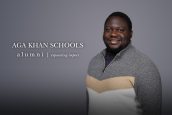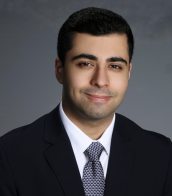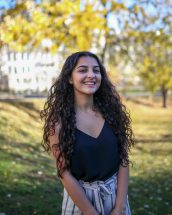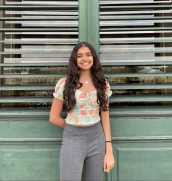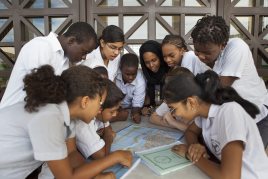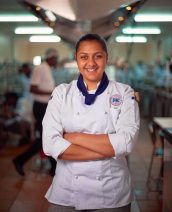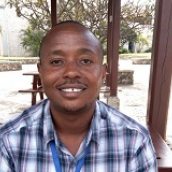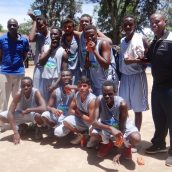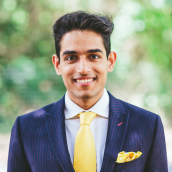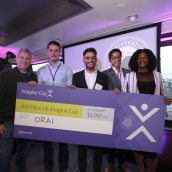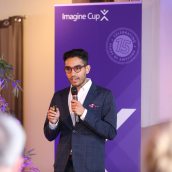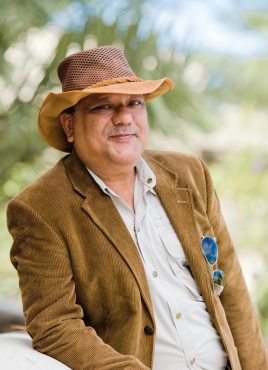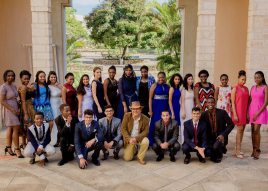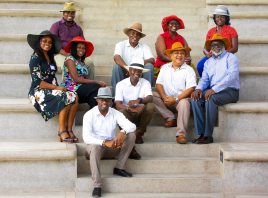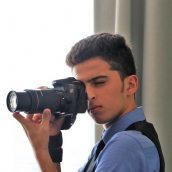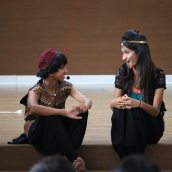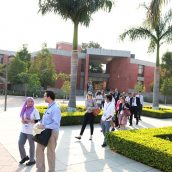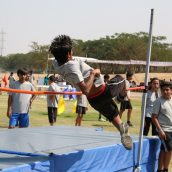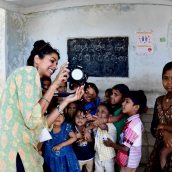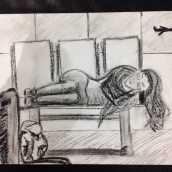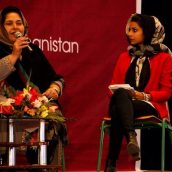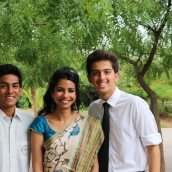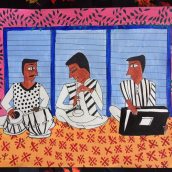At the Aga Khan Academy Mombasa, Ham Serunjogi – CEO and co-founder of African fintech giant Chipper Cash – realised the importance of staying connected to something larger than himself. The Forbes 30 Under 30 honouree is now serving as an advisor to the US President on African diaspora engagement.
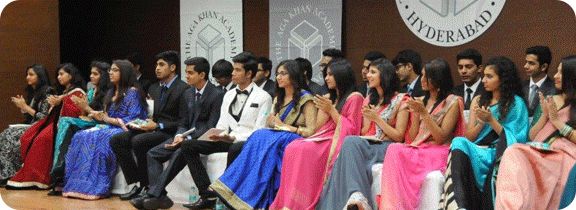
The vision for Aga Khan Academy graduates
Education at its best facilitates positive growth in all domains – intellectual, social, physical, ethical and spiritual – leading to the well-rounded development of the child. The Aga Khan Academies aim toward this ideal, and the values they espouse are reflected in each school’s aspirations for its students.
Students at an Academy pursue a well-balanced education combining intellectual inquiry, academic excellence, sporting and cultural activities, and a grounding in ethics and moral reasoning
They are committed to rigour and self-discipline in their studies and subscribe to the principles of intellectual honesty in the preparation of their work.
They respect their teachers and fellow students. They extend their respect to the cultural, religious and political convictions of others in school and in society. They dedicate themselves to debate issues honestly and fairly. They aim to understand and recognise the value of other views even as they value their own.
They are self-aware and socially conscious. They are committed to the development of their communities, their nation and civil society in the world at large. They are motivated to help others less fortunate than themselves.
They strive to acquire knowledge as part of a balanced, lifelong process of inquiry that leads to intellectual and personal growth, as well as a means to fulfil material goals.
The mastery of a particular discipline is balanced by a broad knowledge of several subjects, including science, art, literature and music.
They are also citizens of the world and at ease in environments and settings other than their own. They are generous and tolerant towards other cultures and traditions.
They are bilingual or multilingual.
They embrace the rich diversity of the world while valuing their own identity.
Read more here.
Interested to know more about our graduates? See spotlights on our alumni
Jimnah Kimani David: Promoting diversity through sports
“I think one of the biggest assets the Academy has is the diverse cultural background in the student body. Having players coming from all over the world from so many walks of life adds a unique element to playing as a team.”
Coach Jimnah Kimani At the Aga Khan Academy (AKA) Mombasa, Jimnah Kimani David wears a lot of different hats. He is the administrative assistant to the vice principal Diploma Progamme, the assistant sports coordinator, as well as a year 6 mentor. However, he is probably best known on campus in his capacity as the open boys’ basketball team coach.Early in his life, Jimnah had never planned to coach a high school basketball team. “I was originally going to go into accounting,” he said. “I later realised I wanted to work with people, and more importantly, with children, which is why I decided to go into education.”
However, he was not entirely inexperienced in his capacity as a basketball coach. Before he graduated in 1999, Jimnah had already begun helping out his high school basketball coach at Mombasa Baptist High School. He was initially taken on as an informal translator for their Texan coach, Stan Littleford, but he quickly became a valuable mentor and role model for the younger players on the team. From then, he grew from strength to strength, eventually leading his team to win two national titles as a player, and one as a coach in 2007.
His stellar coaching skills did not go unnoticed. In the 2012–2013 off-season, Jimnah was approached to take on a role coaching the AKA Mombasa open boys’ basketball team. “I felt I had proven myself as a coach with Mombasa Baptist. But they are an established, well-known basketball school. I relished the challenge of taking on a fresh team and starting with them from scratch.”
Jimnah joined the Academy in August 2012. He had learned about the school from his brother Charles Mwangi Waweru, who attended the Academy and graduated in 2009. “What drew me to the institution was the commitment the Academy had to providing facilities for excellent education to students from all backgrounds,” he reflects.
Danish Dhamani (Class of 2013): Everything’s gonna be Orai
Critical thinker. Life-long learner. Global citizen. Three traits, fostered during his time at the Aga Khan Academy, that characterise Danish Dhamani as he now graduates from Drexel University with a BSc in Mechanical Engineering. A 2013 graduate from the Aga Khan Academy Mombasa, Danish was an integral part of the residential community and president of the Student Representative Council during his two years at the school.
When asked about his most cherished memories, Dhamani reminisced about the sense of community that developed as a result of the residential program. “People became really close to one another, like an extended family. We had meals together, we celebrated birthdays and special occasions together, and we studied together… One really memorable event for me was singing ‘Happy birthday and kata keki’ (‘cut the cake’ in Swahili).” Danish’s term serving as president of the Student Representative Council was similarly rooted in the idea of building a familial sense of community, and most of his events were geared towards achieving this goal.
Four years later, Danish continues to think outside the box and combine his personal interests with making a difference in the society. Upon arriving at university, he discovered that he needed to improve his public speaking skills. Danish realised that this is a problem that affects many people around the world.
His solution to this problem? Orai.
Orai is a mobile app that aims to make anyone become a better public speaker using artificial intelligence. From tracking the number of ‘ums’ and ‘you knows’, to assessing the “tone” of your speech, the app provides a comprehensive report and suggestions on how you could become a better presenter. The intelligent engineering of the algorithms and attention to detail in the app literally leaves no person speechless.
At present, his venture has won approximately $50,000 in prizes. Orai won 2nd place in the Microsoft US Imagine Cup Finals and advanced with 6 other ventures to the Imagine Cup World Finals in July 2017. Motivated to take his venture to the next level, along with his co-founder, Danish will be working full-time on Orai post-graduation. His efforts and dedication towards Orai has now impacted the lives of over 30,000 users around the world.
As he reflects on his time at the Academy, Danish specifically remembers his classes with Mr. Alchin. “He looked at the world very differently,” he notes. Teachers such as Mr. Alchin instilled in Danish the capacity and willingness to think outside the proverbial box. In preparing him for university, both the International Baccalaureate curriculum and the opportunity to engage in extracurricular activities broadened his perspective towards the world and made him a lifelong learner.
His vision for the future is to be able to reside in a world where individuals are exposed to the global issues such as food insecurity and global warming from a young age, and are equipped with knowledge on latest technological advancements to engage in problem solving and action driven initiatives.
By Karina Hussein
Shouquot Hussain: encouraging academic and holistic growth at AKA Mombasa
Shouquot Hussain was born and raised in India and has been the Vice Principal of the Diploma Programme (DP) at the Aga Khan Academy Mombasa for seven years. He says his time and experience at the Academy have been the best seven years of his life, both professionally and personally. “To put it simply, the experience has been magical, happy, growth-inducing and memorable,” Shouquot says.
Shouquot says he will miss everything about the Academy; its diversity, the relationships he built with students and colleagues and the numerous events he got to be a part of. “I will miss it like I miss home,” Shouquot says. “My son literally grew up here. He was in Year 4 when he came here and has now completed the Middle Years Programme (MYP). In fact in all ways barring the passport, he is more Kenyan than he is Indian. Likewise, I will miss the home I built here – within the campus and without. I will miss the Mombasa vibe, which engulfs you with warmth, not frenzy.”
If there’s one thing the Academy has taught Shouquot, it’s to be respectful and accepting of the differences of others. “There are many ways to be right; I always knew this theoretically as an educator, but I got to really practice it experientially here,” He says.
While at the Academy, Shouquot has contributed to several academic achievements. As a teacher in the English department, the Higher Level English class he taught in 2016 achieved an average of 5.92, the highest to be attained thus far at AKA Mombasa. The English Extended Essay (EE) that he supervised went on to score the highest marks yet in Africa. Furthermore, he initiated the Extended Essay Fair where students could visit subject-specific specialists to better understand the expectations of the EE, discuss possible topics and learn about the resources available to students before beginning their EEs.
However, not all of his achievements were academic. Shouquot has always been a champion of activities that encourage the holistic growth of students beyond the classroom. In 2013 he revived the boys cricket programme in Senior School, which has since won a championship. There is now a girls cricket team too. He also established the annual DP play and supported many other programme and events such as TEDxYouth@AKAMombasa and the annual graduation ceremony among others.
“For the last seven years that I have worked with Shouquot, I have come to know him as a passionate teacher who finds his spark working with students,” says Francis Kariuki, Principal of Senior School. “He is also a compassionate person who has the interest of students and colleagues at heart. As a leader, he is firm and supportive with a strong sense of fairness and justice. He has a spontaneous and fun-loving personality with unmatched love for books and movies. He is generous and always looking for opportunities to bring fun to others. We will miss him in the Senior School leadership team.”
For his next stop, Shouquot will be joining the Beacon Academy, an International Baccalaureate (IB) school in Jakarta, Indonesia. There, he will navigate the DP English and Theory of Knowledge (TOK) programmes and introduce DP film studies as a subject. He also says he will support the school reinvent the curriculum design to allow for more experimentation and differentiated pacing with a bigger focus on formative assessments.
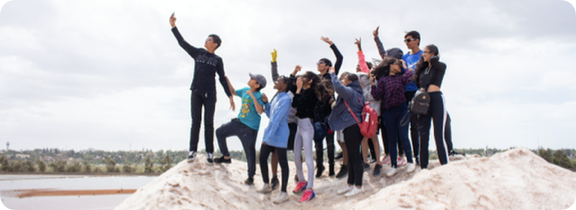
Diploma Programme
The Aga Khan Academy Maputo has received authorisation as an International Baccalaureate (IB) World School offering the IB Diploma Programme (DP). The programme is offered to students (aged 16–19) in the final two years of school.
The Diploma Programme is a demanding, pre-university-level course of studies. It is internationally recognised by over 2,000 universities worldwide.
The DP has a reputation for rigorous assessment of student achievement. Each student’s performance and levels of knowledge are examined internally by teachers according to set criteria. They are also assessed externally by independent examiners according to global standards applied to all IB schools.
Our students study all the subjects covered in a traditional, broad curriculum, including languages, social sciences, experimental sciences, mathematics and the arts. The DP also takes the curriculum a step further through three unique programmes:
- theory of knowledge
- creativity, activity, service
- extended essay.
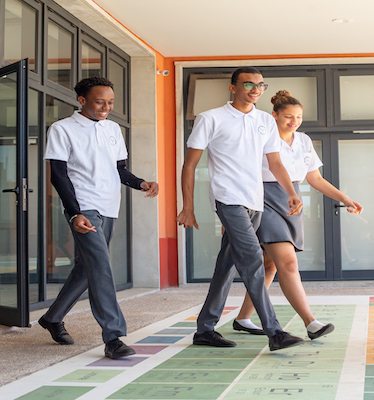 Theory of knowledge
Theory of knowledge
Theory of knowledge (TOK) is an interdisciplinary requirement unique to the International Baccalaureate Diploma Programme. It encourages students to reflect on the knowledge they gain both inside and outside the classroom.
One hundred hours of classroom time are dedicated to the TOK programme. We challenge our students to question the nature of knowledge across disciplines, to recognise biases and to analyse evidence using rational thought and argument. By making our students consider and appreciate different perspectives, TOK contributes towards a pluralistic outlook.
Creativity, activity, service
Creativity, activity, service (CAS) is an important component of the IB curriculum and is required for every DP student at the Academy. Our students participate actively in a variety of creative endeavours, physical activities and community service projects. They develop self-confidence, teamwork and leadership skills, and a sense of civil responsibility.
Students take part in sustainable projects that have real and lasting effects on the greater Maputo community. They develop strength of character and an understanding of their ability to bring about change.
The CAS programme is valued for its power to transform the lives not only of students but also the people they work with. It serves as a platform for interpersonal exchange, personal growth and greater understanding of the issues we face as a global community.
Extended essay
The extended essay requires students to pick a subject of their choice and research and develop it into a 4,000-word essay. Students may choose to investigate a subject from one of their higher-level courses more deeply. Or they can broaden their academic experience by researching a subject in a field they are not currently studying.
Through the extended essay, we introduce students to the kind of independent research and writing skills expected at the university level.
Career-related Programme
The Academy is a Candidate School* for the Career-related programme.
*Only schools authorised by the IB Organization can offer any of its four academic programmes: the Primary Years Programme (PYP), the Middle Years Programme (MYP), the Diploma Programme, or the Career-related Programme (CP). Candidate status gives no guarantee that authorisation will be granted. For further information about the IB and its programmes, visit www.ibo.org.
For further information on the IB Diploma Programme at the Academy, please see the admission requirements or contact us.
International Baccalaureate - Middle Years Programme
International Baccalaureate - Middle Years Programme
Samy Natho Jina: Using information technology to better the world
Samy Natho Jina is an International Baccalaureate (IB) Diploma Year 12 student at the Aga Khan Academy Mombasa. In addition to being an informed global citizen, Samy is a skilled and talented self-taught computer coder. Currently pursuing Information Technology in a Global Society at higher level as part of his IB Diploma, he strives to derive ways through which he can use information technology (IT) to create value in today’s society and tackle social and ethical issues. He says, “Building systems is not enough; for me, considering the impact on the stakeholder’s life is also a key factor.”
Samy’s passion for computers began on his sixth birthday when he received a “slow and old Acer laptop.” He says that because the laptop was too slow to play computer games, he used his time to explore the computer’s settings and discovered all the features that were being offered by Windows XP. As a result of his vivid curiosity and experimental nature, Samy unknowingly installed virus software which caused the computer to crash. Determined to fix his computer, Samy tried all the possible methods to restore it: he sought advice from many adults, attempted creative problem-solving techniques, and even visited a computer scientist to figure out what was happening.
Ultimately, Samy’s curiosity and determination led him to discover that this – dealing with computers and software – was what he wanted to do for a living in the future. Samy now aspires to develop his skills at university through studying software engineering and computer science.
Along with being a hardworking IB student, Samy is constantly working on new applications, coding new projects, and making apps for various companies. The first app he created was for his parents to help their pharmaceutical company handle online business management, archive files and track sales. He created another security software for a non-profit organisation for referencing and tracking individuals for an event. Samy also designed an advanced website for a TEDx event in Mombasa, Kenya where he added security and ticketing features. Samy comments, “As my understanding increases so does my passion.” An extremely driven individual, he also uses online platforms such as OpenClassrooms to learn coding languages like HTML5, CSS3, JavaScript, PHP5, jQuery and others, for which he has also gained many certificates. “With each new language I learn, I become more excited about that field,” Samy explains.
Samy believes that in five to 10 years, the whole world will depend more on information technology than it currently does today. He believes that there is a great future in developing modern technologies for medical applications, and wishes to be at the core of the technological development that will advance medical health applications. Samy believes in practical application along with theoretical learning and is working hard to bring about a positive change.
Samy is extremely grateful for the opportunities he has been granted to use his skills for the betterment of the local community with support from the encouraging environment at the Aga Khan Academy Mombasa. Samy says, “For each and every project, I have spent countless nights out of my own free will fixing incorrect lines of code. It is my dream to make sure this talent and passion I have for software development and computers can be used to make this world a better place.”
By Khushboo Shah
Nabil Patel: photographer par excellence and published author
Kamini Menon – communications for change
Naheed Hirji Keynote Speech at 2016 Peace Summit
Naheed Hirji, Growth and Partnerships Manager at Facebook, Africa was one of the Keynote speakers at the Peace Summit 2016. Naheed has in the past worked with Microsoft, Zynga and various social enterprises that are using technology to make a positive change in the world. He currently works on growing internet penetration in Eastern and Southern Africa using Facebook’s free basics (Internet.org).
Naheed stirred an interesting discussion around the theme of using Internet as a tool for peace. He started off with a conversation around the question “Is internet a human right?” Students responded with some interesting claims including the fact that humans have lived without the Internet before so why can’t they now? However, some brought up the issue of censorship and how governments monitor the public, compromising privacy. A discussion on whether or not internet is a tool for peace followed. Opinion was split in the room at first. The proposers argued how awareness and fundraising for important causes can be done using social media while the opposing side argued that the internet has given birth to cyber bullying.
This discussion finally led up to Naheed sharing how he came to a conclusion about this and why he took the job at Facebook. Naheed was a technology geek growing up but wanted to make a difference using technology. When he was offered the job at Facebook, he was uncertain about the impact he would be able to make, so he used IKIGAI. IKIGAI is a Japanese concept meaning "a reason for being". Everyone, according to the Japanese, has an IKIGAI. Finding it requires a deep and often lengthy search of self. IKIGAI evaluation consists of 4 questions: Are you doing something that you love? Are you doing work or deeds that the world needs or will be better for? What is it that you are really good at? And finally, is it possible to monetize this? His job was going to be to grow internet users in Africa, but how would this benefit people and the world? He thought to himself, the internet is a breeding ground for cyber bullying, spreads false information and hate speech and reduces individual privacy. He used the examples of ISIS and the conflict between Apple and the US government. However, the internet has the incredible power to connect people around the world, enable friends and families to communicate, improve job creation, education and health care levels, gives us information on our fingertips and gives everyone a voice and the power to share their opinion. If he were to help launch free basics, it would make the internet accessible to more people by providing them access to a range of free basic services like news, maternal health, travel, local jobs, sports, communication, and local government information, assisting them to improve their lives. He was going to be able to use technology to make a difference in the lives of billions of people. When he took the job at Facebook, he was sure he had found his IKIGAI.
He believes the internet and technology can be used as a tool for peace. All that is required is a change of attitude, being informed and critical thinking. “We must strive to become responsible citizens of the internet, break cultural, societal and political barriers and engage in respectful dialogue.” he said. He ended by sharing the idea behind peace.facebook.com, which demonstrates friendship and understanding in the most unexpected places and which is what we must aim to achieve using the internet.
By Inaara Gangji, DP1 (The Reporters)
